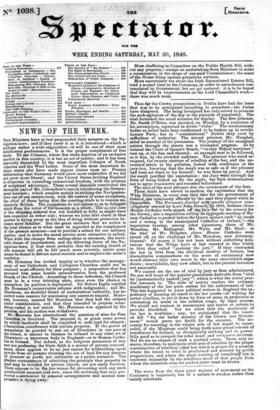Thus far the Crown prosecutions in Dublin have had the
issue that was to be anticipated according to precedent—the Juries have disagreed. The being arraigned has only served to promote the arch-agitators of the day to the pinnacle of popularity. The trial furnished the usual occasion for display. The first prisoner, Mr. Smith O'Brien, was escorted, on Monday, by a concourse of his accomplices, organized in divers "clubs." The revolutionary bodies so called have been condemned to be broken up in revolu- tionary Paris ; but in " constitutional " Dublin they exist by sufferance of authority. The second prisoner, Mr. Meagher, acted asmarshal of the procession. The journey of the arraigned patriot through the streets was a triumphal progress. As he entered the Court of Queen's Bench, " twenty Repeal barristers" rose up, at the bar, and cheered; an example sure to be followed, as it was, by the crowded audience. The prisoner who stood ar- raigned, the twenty abettors of rebellion at the bar, and the un- counted rebels in the galleries, looked with confidence at the jury-box, knowing that the result was as safe as if the prisoner had been set there to try himself : he was there by proxy. And the result justified the expectation : the Jury went through the form of being locked up for the night, but their determination not to agree was known and recorded beforehand. The trial of the next prisoner was the counterpart of the first. These trials have served to confirm the impression that the Whig Ministers, in every step they take for the government of Ireland, are injuriously affected by the part they played while in Opposition. The Freeman's Journal now-quotes eloquent corn- wet/daces uttered by Lord John Russellrin 1844, because eleven itoffian Catholics were Straek off the jury-list by the counsel for the Crown ; also a requisition calling an aggregate meeting of Ro- man Catholics to protest before the Queen against such" an insult and a -wrong to the emancipated Catholics of Ireland,"—the requisition bearing, among other signatures, those of Mr. Monahan, Mr. Redington, Mr. Wyse, and Mr. Sheil : at the trial of Mr. Meagher, eleven Roman Catholics were struck off, on the challenge of Mr. Monahan, now Attorney,- General! Of course it has not been without enfeebling hesi- tations that the Whigs have at last resorted to that which in 1844 they called "packing the jury." If they obstructed the law in 1844 from the invidious motives of faction, less discreditable compunctions on the score of consistency now would obstruct their own resort to the same unavoidable expe- dients ; unavoidable, they now admit, but in the present instances not successful.
We cannot see the use of trial by jury as thus administered. No one will boast of the popular guarantees derivable from " trial by [systematically packed] jury "; which is what the actual prac- tice amounts to. The state of society renders the ordinary machinery of the law quite useless for the enforcement of law. This has suggested to some political writers in England the ex- pediency of disusin,g all resort to the law courts—of waiting for actual rebellion, to put it down by force of arms, in preference to attempting its arrest in the sedition stage, by legal process. ‘Ve would not venture to recommend any course so certain to provoke bloodshed. Yet we allow that the machinery of the law is worthless ; nay, we anticipated that the vaunt- ed bill " for the better security of the Crown and Govern- ment" would prove too feeble for the occasion. The ne- cessity for resorting to the vulgar aids of law might be super- seded, if the Ministers could bring forth some grand scheme of
beneficence for Ireland, so dramatically striking and so power- fully good as to conquer the rebel heart and overpower mistrust.
But we see no chance of such a poetical event. There only re-
mains, therefore, to anticipate overt acts of rebellion by the proper counteractive of rebellion—that law which is proper fur a country
where the intent to rebel is proclaimed and attested by active preparations, and where the usual working of unmilitar/ law is rendered impossible by the rebellious mood of that people from whom the materials even for packed juries must be drawn.






















